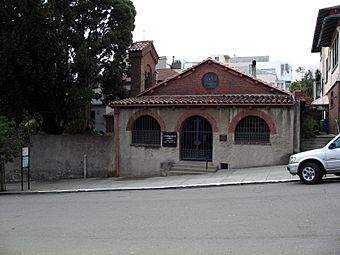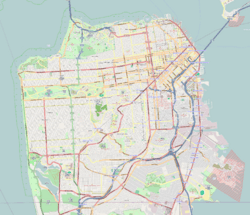Swedenborgian Church (San Francisco) facts for kids
|
Swedenborgian Church
|
|
 |
|
| Location | 2107 Lyon Street, San Francisco, California |
|---|---|
| Built | March 17, 1895 |
| Architect | A. Page Brown, A. C. Schweinfurth, Bernard Maybeck |
| Architectural style | Bungalow/Arts and Crafts |
| NRHP reference No. | 04001154 |
Quick facts for kids Significant dates |
|
| Added to NRHP | August 18, 2004 |
| Designated NHL | August 18, 2004 |
The Swedenborgian Church is a special old church building located at 2107 Lyon Street in the Pacific Heights neighborhood of San Francisco, California. It was built in 1895 for a group of people who followed the Swedenborgian faith. This church is famous because it's one of the very first buildings in California designed in the pure Arts and Crafts style. Many talented people helped design it, including A. C. Schweinfurth, A. Page Brown, Bernard Maybeck, William Keith, and Bruce Porter. Because of its unique history and design, it was named a National Historic Landmark in 2004.
A Special Design: The Arts and Crafts Style
The Swedenborgian Church is found at the corner of Lyon and Washington Streets in San Francisco. The church complex includes the main church building, a house for the pastor (called a parsonage), and a parish house. These buildings are surrounded by beautiful gardens.
To enter the church, you walk through an arched doorway. This arch is part of a covered entrance area, or portico, that faces Lyon Street. The main church building is one story tall. Its walls are very thick and made from different colored and textured bricks.
Inside the Church
The roof of the church is supported by strong, heavy wooden beams. You can see these beams inside the building, which adds to its unique look. The doors leading into the church are made of dark oak wood. They have special hinges made of hand-wrought iron, which means they were shaped by a blacksmith.
Inside the main part of the church, you'll notice huge wooden timbers. These are mostly made from madrone wood. The lower parts of the walls, called wainscoting, are covered in Douglas fir wood. All these natural materials give the church a warm and earthy feel.
Who Designed It?
The first pastor of the church was Reverend Joseph Worcester. He bought the land and worked closely with the architects to plan the church. Many creative minds helped with the design. These included A. C. Schweinfurth, A. Page Brown, and Bernard Maybeck. Artists like William Keith and Bruce Porter also contributed their ideas.
Reverend Worcester believed that the new Arts and Crafts movement style fit well with Swedenborgian teachings. This movement focused on creating beautiful things by hand, using natural materials, and living in harmony with nature. The church officially opened for worship on March 17, 1895. It still looks very much the same as it did when it was first built, preserving its original charm and design.
 | Jackie Robinson |
 | Jack Johnson |
 | Althea Gibson |
 | Arthur Ashe |
 | Muhammad Ali |




